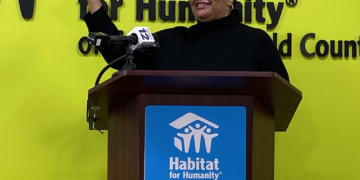
Women who aspire to success should not be shy about asking for what they are worth, need to seek out mentors and must never be afraid to stand up for who they are.
That was the advice from five influential and successful women on a Feb. 28 panel titled “Powerful Women” at The College of New Rochelle in Westchester County.
“Each of us has the power to change ourselves and our lives. Think of yourself as a powerful person, because you are,” said panelist Kay Koplovitz, founder of USA Network and the first network president in television history.
The luncheon panel, sponsored by Fairfield County Business Journal parent Westfair Communications Inc., was billed as an “interactive, on-the record conversation” between the panelists, the audience and a team of journalists.
In addition to Koplovitz and moderator Elizabeth A. Bracken-Thompson, a partner at Briarcliff Manor, N.Y.-based advertising and public relations agency Thompson & Bender, panelists included:
Ӣ Cindi Bigelow, president of Bigelow Tea in Fairfield;
Ӣ Jennifer Tombaugh, president of Tauck, the oldest U.S. tour operator;
Ӣ Judith Huntington, president of The College of New Rochelle and a New Milford resident; and
Ӣ Dr. Michelle A. Koury, chief operating officer at Crystal Run Healthcare, a multispecialty group practice in Orange County, N.Y.
The audience of about 300 did not pull any punches with their questions.
“How do we as women close the gap between what we perceive (here today) and reality TV?” asked an audience member who identified herself as a Girl Scout leader.
“I think there is a danger in the way women are portrayed in the media today,” said media executive Koplovitz. “Each one of us has to act as a mentor and project ourselves as authentic. This isn”™t the way it needs to be. Stand up for who you are ”“ do not make yourself into a victim.”
The antidote to reality TV is education, added Huntington.
Another attendee wanted to know how do women balance wanting to be liked versus being who they are.
“What trumps being liked is getting a job done, and being effective,” Huntington said.
Handling pressure with “aplomb and grace” is critical, said Koury, adding that in her practice she is often faced with the need to make tough choices. “You can make hard decisions in a way that does not rob other people of their dignity.”
“Understand always that you are focused on the mission,” said Bigelow, head of the now-famous tea company founded by her grandmother 65 years ago. In meetings with her all-male executive team, Bigelow said, “If we go off task, we are going to go on task again very quickly.”
One attendee asked about whether women are helping or hurting each other in the workplace and asked the panelists to describe their own experiences.
“When I was growing up,” said Koplovitz, “promoting other women was considered a weakness. But in the last 10 years, (I have seen) women cheering for each other. It is change that is positive.”
How can women be assertive without being perceived as aggressive, another audience member wanted to know.
“As a listener, I am confident,” Koury said. “But when you are speaking, you have to remember to say it in a way that the person you are speaking to will hear it.”
What about salary inequality between men and women, another attendee asked.
“Men are very comfortable asking for more (money),” Tombaugh said. “Women don”™t ask as often as perhaps they should.”
Koury had this advice for women in salary negotiations: “If you don”™t ask, you don”™t get. Do your homework, know exactly what you want and make that your number one priority in any negotiation.”
Panelists agreed that it is especially important for women to have mentors in their careers and allies that give frank feedback.
One more thing, Tombaugh said, “Always keep a sense of humor.”



















